Munitions Production at Defence Industries Limited Factories National Historic Event
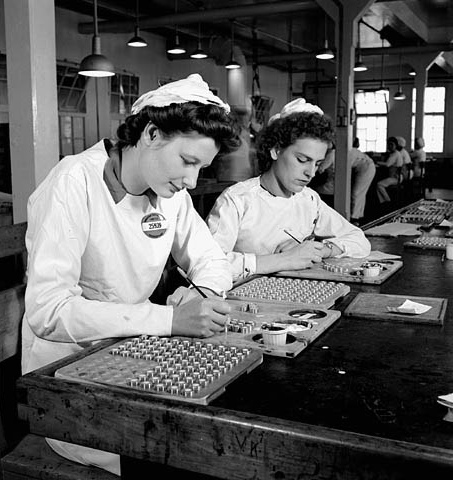
© Harry Rowed / National Film Board of Canada. Photothèque / Library and Archives Canada
The production of munitions at Defence Industries Limited factories was designated as a national historic event in 2024.
Historical importance: production of a massive arsenal of ammunition and its components, a major contribution to Canada’s war effort in the Second World War and in Allied victory, but also leading to long-term environmental contamination at many sites.
Commemorative plaque: no plaque installedFootnote 1
Munitions Production at Defence Industries Limited Factories
The production of munitions during the Second World War at Defence Industries Limited (DIL) factories in Manitoba, Ontario, and Quebec, made a major contribution to Canada’s war effort. The massive arsenal of ammunition and components produced at DIL factories played an important part in the Allied victory and helped propel Canada to become the fourth-largest munitions-producing Allied nation. Thousands of workers were recruited from across Canada to work the assembly lines, and the large proportion of women in DIL’s factories show the important role that women played in munitions production. These massive efforts were not without their costs. Toxic and hazardous materials handled during these processes posed a risk to the health of workers and led to environmental contamination of factory sites.
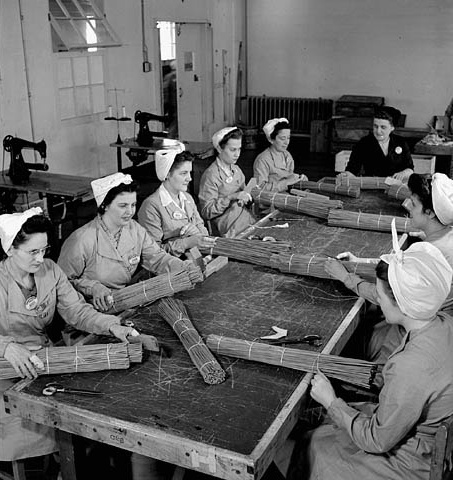
© Harry Rowed / National Film Board of Canada / Library and Archives Canada / PA-116926
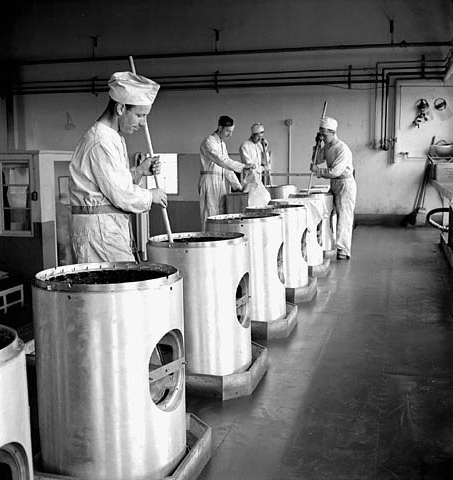
© Harry Rowed / National Film Board of Canada / Library and Archives Canada
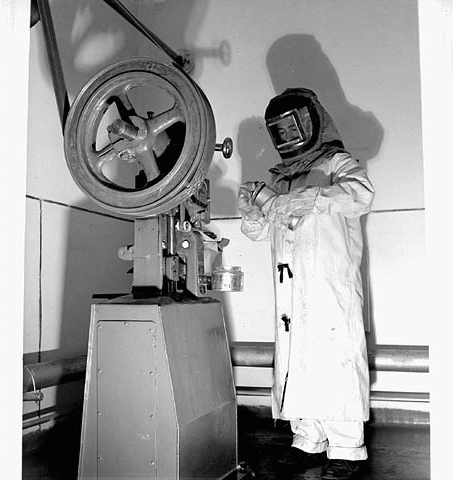
© Harry Rowed / National Film Board of Canada / Library and Archives Canada
The development of DIL, a wartime public-private military contractor formed in 1939, shows the fundamental role that the government played managing the war economy during the Second World War. The Allied War Supplies Corporation, directed by the Department of Munitions and Supply, oversaw the funding, construction, and expansion of war industry. DIL was a wartime subsidiary of Canadian Industries Limited (CIL), a private company which had developed expertise in the manufacturing of explosives and ammunition since the late 19th century. While the federal government was the owner of many of the factories and their wartime products, DIL was responsible for their management and was paid a fee accordingly. DIL factories in Pickering (now Ajax, Ontario), Saint-Paul-l’Ermite, and Sainte-Thérèse (Quebec), along with a General Engineering Company plant in Scarborough (Ontario) formed the heart of shell production in Canada. DIL plants in Nobel (Ontario), Transcona (Manitoba), and Salaberry-de-Valleyfield and Beloeil (Quebec) produced explosives to fill shells and small arms ammunition. Other chemical and ammunition factories across Ontario and Quebec formed an integrated munitions production system which assembled billions of rounds of small arms ammunition, millions of artillery rounds and their components, and produced explosives and chemicals for the war effort.
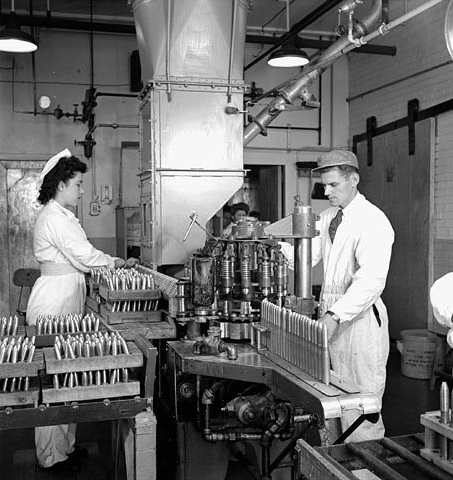
© Harry Rowed / National Film Board of Canada / Library and Archives Canada
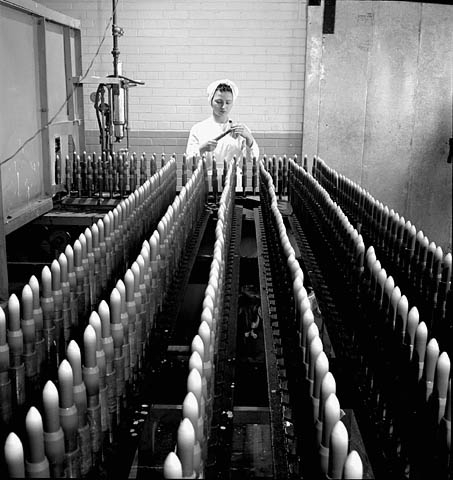
© Harry Rowed / National Film Board of Canada / Library and Archives Canada
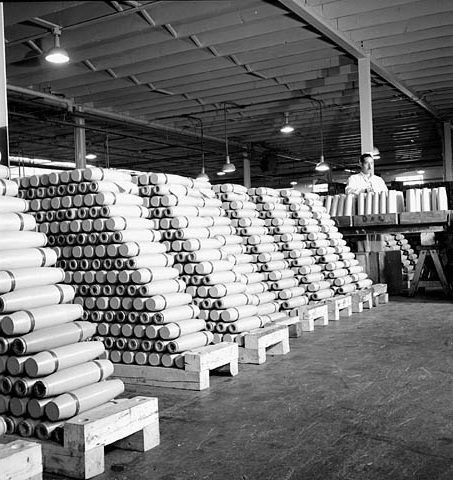
© Harry Rowed / National Film Board of Canada / Library and Archives Canada
The Second World War saw a large shift of women into the manufacturing sector, expanding beyond work in textile factories. The efforts of the government’s National Selective Service agency brought more than a quarter of a million women from across the country into war industries in 1942–43. By July 1944, over 107,000 workers were employed in the munitions industry in Canada, with around 40 per cent of this workforce made up of women. They received lower wages than men, but many were proud of their contributions to the war effort. At its largest, DIL employed around 33,000 workers in its plants.
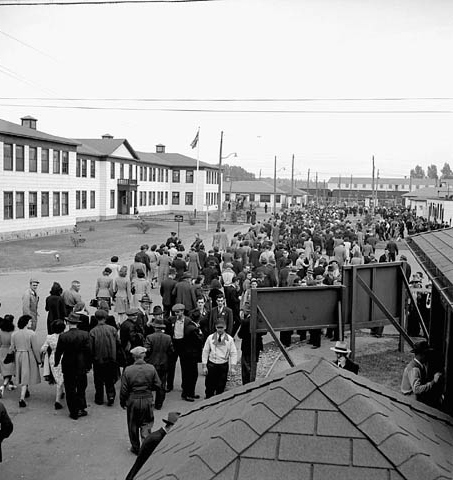
© Harry Rowed / National Film Board of Canada / Library and Archives Canada
The legacy of DIL’s war effort provided for the basis of Cold War munitions production in Canada, but also institutional, industrial, and residential infrastructure for post-war Canada, notably in what is now the city of Ajax, Ontario. Defence Industries Limited also left an impact on the environment and workers’ health. Millions of litres of freshwater were contaminated through munitions production, particularly in the manufacture of the explosive trinitrotoluene (TNT). Exposure to such toxic chemicals had negative long-term repercussions for workers, who were also exposed to the many other risks which characterized factory production in the era.
“I am extremely pleased that Munitions Production at Defence Industries Limited (DIL) Factories has been designated as a National Historic Event under the National Program of Historical Commemoration. The operation of the DIL plant in Ajax played a vital role in Canada’s war effort during the Second World War and attracted thousands of workers to our area from communities across Canada. It was these workers, and the community that they built, that eventually led to the founding of the Town of Ajax. We are extremely proud of our history and are pleased that it is being recognized at the national level.”
This press backgrounder was prepared at the time of the Ministerial announcement in 2024.
The National Program of Historical Commemoration relies on the participation of Canadians in the identification of places, events and persons of national historic significance. Any member of the public can nominate a topic for consideration by the Historic Sites and Monuments Board of Canada.
- Date modified :